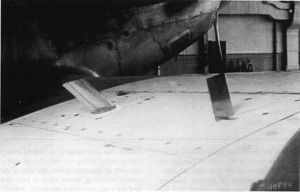Category:Design methodology: Difference between revisions
From ETHW
No edit summary |
No edit summary |
||
| Line 1: | Line 1: | ||
[[Image:Design Methodology NASA Langley Research Center Wing Flow Model and Test Apparatus.jpg|thumb|right|The NASA wing-flow model and test apparatus mounted on the P-52 wing with a flow-direction vane]] | |||
Topics that pertain to design and creation, including critical thinking methods, sustainability and articulation. | Topics that pertain to design and creation, including critical thinking methods, sustainability and articulation. | ||
== Subcategories == | == Subcategories == | ||
| Line 17: | Line 18: | ||
*'''[[:Category:Virtual prototyping|Virtual prototyping]]''' - creating a simulated prototype product to be tested online | *'''[[:Category:Virtual prototyping|Virtual prototyping]]''' - creating a simulated prototype product to be tested online | ||
[[Category: | [[Category:Scientific_tools_and_discoveries|{{PAGENAME}}]] | ||
Revision as of 18:01, 17 May 2013
Topics that pertain to design and creation, including critical thinking methods, sustainability and articulation.
Subcategories
- Design for disassembly - techniques designing products so they can be easily and responsibly disassembled or disposed of
- Design for experiments - designing objects for experimentation
- Design for manufacture - design objects for ease and facility of manufacturing
- Design for quality - design to ensure quality production
- Design for testability - design products to ensure resilience and ease of testability
- Graphics - visual presentations on a surface
- Process design - the design of processes for the physical and/or chemical transformation of materials
- Product design - the designing of commercial products for sale or use
- Prototypes - early samples or models built to test the feasibility and use of a product
- Technical drawing - a drawing specifying the technical requirements of a product
- User centered design - or UCD, also known as pervasive usability, a design process where the needs and wants of the end-user of a product are given foremost attention at each stage of design
- Virtual prototyping - creating a simulated prototype product to be tested online
Subcategories
This category has the following 8 subcategories, out of 8 total.
Pages in category "Design methodology"
The following 16 pages are in this category, out of 16 total.
Media in category "Design methodology"
This category contains only the following file.

